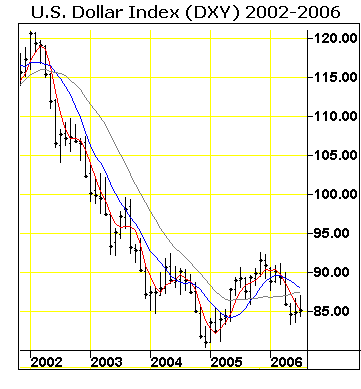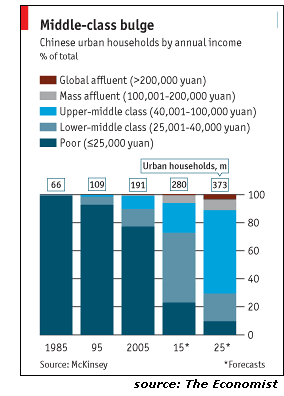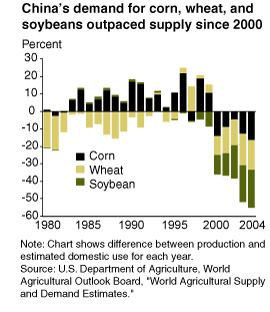wie rational ist china? / importierte inflation
http://www.oftwominds.com/blog.html
highlights:
Now let's turn to our primary export to China: inflation. Have you ever read anything in the financial media which asks this question: if the value of the U.S. dollar has fallen by almost 50% since 2002 (see chart), what happens to countries which have pegged their currency to the dollar--like, for instance, China?

Funny, I've never read an exploration of that question, either. Yet the answer is rather obvious, isn't it? Everything imported costs more for them just as it does for us. And what does China import in vast quantities? Commodities: oil, cement, soybeans, rice, wheat, copper, etc. Oil, of course, is currently priced in dollars, so the Chinese pay no premium for the dollar's recent devaluation. But if the oil exporters ever decide to price oil in non-dollar currencies, the cost of oil in both the U.S. and China would skyrocket. (überlegt mal wie teuer unsere spritpreise usw wären wenn der € nicht 50% gegebüber dem $ zugelegt hätte!)
And not all commodities are priced in dollars. Certainly, the high-tech machinery and equipment which China imports from Japan and the E.U. is 40% higher than it was in 2002--or the Japanese and E.U. exporters are getting 40% less if they've kept the price the same as in 2002.
Let's be clear on this: either China pays much more for imported goods because of the dollar devaluation, or those exporting to China are making far less profit--if any. The rah-rah standard line of China-related euphoria is encapsulated in this chart from The Economist's article Ready for warfare in the aisles (Retail trade in China).
The standard line is: China's middle class is growing rapidly, and retailers will be able to charge enough for both imported and domestic goods to make a tidy profit. But rising inflation in China casts some doubt on that; as recently chronicled here, typical factory wages are about $60 - $85 a month--about $1,000 a year. Farmers in the vast hinterland make much less.

There is another fly in this "rah-rah retail paradise" ointment: high prices. Even though the vast majority of people are very poor, things are not cheap in China. Having traveled in China recently, and in Thailand and Japan as well, I can report that goods are not cheap in China. Standard items like cotton T-shirts and street-vendor meals are cheaper in Thailand--and we're not even talking about medical care or real estate. When I first visited China in 2000, rather ordinary condominium apartments in Suzhou (an hour west of Shanghai) could be had for about $40,000. (In China, the condos are just concrete shells with plumbing and electrical stub-outs; the new owner has to add the interior walls, flooring, ceilings, cabinetry, plumbing and electrical fixtures, etc.)
Now the exchange rate is about 8 yuan to the dollar. The Economist pegs 40,000 yuan per year as a middle-class benchmark, which translates into about $5,000. Upper-middle class income is thus about $10,000 annually. So back in 2000, a lower-middle class family could buy a simple apartment for about 10 times their annual income, while their better-off brethren would only require about 5 times income.
That upper-middle class, of course, is a relatively small sliver of the population. (10 million out of 1.2 billion). So what's that condo selling for now? Try $150,000 - $200,000. That's dollars, not yuan. So even the upper-middle class household now has to pay 20 times their annual income to buy an apartment in a secondary city--clearly impossible. Wages in China have only recently begun to rise; like wages in the U.S., they have not kept pace with inflation.
So what is the net result? Rising demand and a falling dollar have boosted the prices for commodities and imported goods, creating a rampant (if officially unreported) inflation which hits all Chinese consumers equally hard. Real estate (yes, we exported our housing bubble to China, via our flood of dollars) and medical care are unaffordable to the vast majority of Chinese households.
(wenn man jetzt noch bedenkt das die chinesen mit den ganzen $ im prinzip wertlose us bonds kaufen muß man sich wirklich fragen wer ausser den usa von diesem wahnsinn profitiert. auf der anderen seite würde wohl in den usa der bonsmarkt kollabieren wenn die chineses aufhören nicht mehr zu kaufen. ganz zu schweigen davon wenn sie anfangen sollte etwas von den 1 trilionen $ zurückzufordern. gott bewahre......)
As the dollar has plummeted, creating inflation and decimating E.U. and Japanese exporters' margins, who's made money? Retailers? I think not. While the chart above suggests that the rise of the Chinese middle class is a mighty inexorable wave, it neglects to mention that inflation and a bubble in housing has rendered their "middle-class" income not very middling. The notion that the average "middle-class" household with an income of $5,000 - $10,000 a year is able to spend lavishly on consumer goods even as inflation and rising commodity prices diminish their purchasing power--skepticism is again in order. And what about the workers who make $1,000 a year?
Lastly, let's speculate on what may happen to commodity prices if crop failures, or oil supply disruptions, or a big decline in the dollar occur. Just to give you a taste: the average middle-class American family spends about 5% of its household income on food. The average Chinese household spends 40% - 60% of household income on food. A similar imbalance exists in the relative weight of oil costs. What is a trivial amount to an American (gasoline is perhaps 3% of household income) is a heavy burden to a typical Chinese household.

bin mir sicher das die bindung yuan an den us$ nicht mehr lange aufrecht gehalten wird. irgendwann werden die chinesen merken das die usa verbindlichkeiten unter berücksichtigung von den verpflichtungen von social security und medicare (vergleichbar bei uns mit der rentenkasse und einen zuschüssen zur krankenversicherung) von 55 trillionen $!!!!! bos ins jahr 2050 mit sich rumschleppen. dazu nur ne scheinbar starke wirtschaft die auf dem reiten eines bubbles zum nächsten basiert. das alles dürfte sich auf den $ nicht vorteilhaft auswirken.
gruß
jan-martin
disclosure: short $, long gold/goldminen
![[Most Recent Quotes from www.kitco.com]](http://www.kitconet.com/charts/metals/gold/t24_au_en_usoz_2.gif)
![[Most Recent Quotes from www.kitco.com]](http://www.kitconet.com/charts/metals/gold/t24_au_en_euoz_2.gif)

0 Comments:
Post a Comment
<< Home